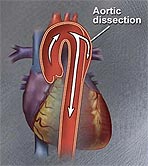Aortic dissections are a medical emergency. They can be treated either medically or surgically. Generally the treatment of choice for ascending aortic dissections is surgical intervention. Surgical intervention is also used for complicated descending dissections. Various issues determine whether an aortic dissection will be treated medically or surgically. We will be addressing the medical management of aortic dissections in this article.
Following you will find the relative contraindications for surgical intervention:
- Cerebral vascular accident
- Severe left ventricular dysfunction
- Pregnancy
- Coagulopathy
- Less than 6 months out from an AMI

- Significant arrhythmias
- Severe valvular disease
- Advanced age
(Mary C Mancini, 2013)
As mentioned above medical management is the treatment of choice for descending aortic dissections, unless they are leaking or ruptured. Medical management consists of decreasing the blood pressure and the contractility of the heart. Medical management with antihypertensive therapy, including beta-blockers, is the treatment of choice for all stable chronic aortic dissections. (Mary C Mancini, 2013)
Careful monitoring of the blood pressure and patients fluid volume is imperative. The patient should be admitted to an intensive care unit where the capability of arterial pressure monitoring and CVP monitoring is available.
It is important to decrease the contractility of the patients’ heart, therefore negative inotropic medications should be considered. Examples of these types of medication are beta-blockers and Calcium channel blockers. Examples of beta-blockers that are used either orally or intravenously are labetalol, propranolol, and esmolol.
Often these patients will initially be on intravenous medications to aggressively reduce the blood pressure and the contractility of the heart. Examples of intravenous drugs used include nitroprusside, intravenous labetalol (acts to both decrease blood pressure and decrease contractility), and intravenous diltiazem (acts to both decrease blood pressure and decrease contractility). It is imperative that nursing closely monitor the blood pressure. Alarms for the blood pressure readings should be carefully set to meet the needs of this type of patient. In the unit that I worked in previously nurses routinely set the blood pressure parameters for a high of 160 and a low of 90. This setting would be inappropriate for a patient being medically managed for an aortic dissection. The high limit would be more like 120 (even 110) and the low at 90.
There are contraindications for beta-blocker therapy. They include:
- Heart block
- Uncompensated heart failure
- Bradycardia (heart rate less than 60)
- Severe asthma
- Severe chronic obstructive pulmonary disease (COPD)
- Hypotension
There are contraindications for Calcium channel blocker therapy. They include:
- 2nd or 3rd degree atrioventricular block
- Sick sinus syndrome
- Hypotension
- Left ventricular dysfunction
- Pulmonary congestion
There are contraindications for the use of a nitroprusside intravenous drip. They include:
- Poor cerebral perfusion
- Poor coronary perfusion
(Mary C Mancini, 2013)
The key for nurses managing these patients is to very closely monitor the blood pressure and fluid volume of the patient. Titrating the intravenous medications the patient is on needs to be done carefully and constantly until the desired affect is reached. A blood pressure that is too high can rupture the dissection, cause absence of blood flow to the kidneys and lower extremities, and possibly death.
If you have a case involving an Aortic Dissections Alvin & Associates, Legal Nurse Consultants would be happy to assist you with a review of your case.
Works Cited
Mary C Mancini, M. P. (2013, March 5). Aortic Dissection Treatment & Management. Retrieved August 13, 2013, from Medscape: http://emedicine.medscape.com/article/2062452-treatment
Staff, M. C. (2011, November 11). Aortic dissection. Retrieved August 13, 2013, from Mayo Clinic: http://www.mayoclinic.com/health/aortic-dissection/DS00605/DSECTION=treatments-and-drugs
Leave a Comment